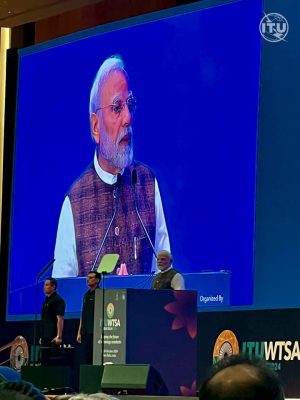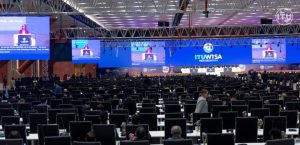The World Telecommunication Standardization Assembly (WTSA-24) has begun in New Delhi, India, with calls for consensus, ethical artificial intelligence, and universal connectivity.
The event offers a platform for policymakers, industry leaders, and tech experts to consider global actions to reinforce the ITU’s standardisation work, the UN agency for digital technologies.
The opening ceremony highlighted the push for universal connectivity, the need for ethical artificial intelligence (AI), the critical importance of consensus, and how digital inclusion can make a meaningful difference in people’s lives.

India’s Prime Minister, Mr. Narendra Modi, inaugurated WTSA-24 alongside the India Mobile Congress at a joint opening ceremony. He said, “The objective of WTSA is to work on global standards. At the same time, the India Mobile Congress plays a very big role in giving services to people. So, from that point of view, with this event that is taking place here, we are working on both standards and services, and both have been brought to one platform today.”
Modi added, “Whatever standards we set in this field, will set the path of our future. Therefore, security, dignity, and equity—on these principles we have to work, and this should be the centre stage of our discussion.
Our objective should be that no country, no region, and no community should be left behind in this digital era,” he emphasized.
Held every four years, WTSA sets priorities for experts worldwide who work year-round to develop the international standards established by the ITU.
Also Read: Nigeria Set to Host International Conference on Biotechnology
The first WTSA ever held in the Asia-Pacific region will run from 15 to 24 October and comes at a time when India’s government, vibrant tech industry, and research communities have become increasingly engaged in the ITU’s standardization work.
ITU Secretary-General, Ms. Doreen Bogdan-Martin, said, “The world has a lot to learn from what India has accomplished with the Unified Payments Interface, Aadhaar, and other building blocks of today’s digital economy.”
“This global gathering calls for bold, collective action. In the next ten days, we can strengthen the role of international standards as the bedrock of global digital governance,” she said.
ITU’s standardization work is driven by the contributions and consensus decisions of its membership, which includes 194 Member States and over 1,000 member companies, universities, and international and regional organizations.

WTSA reviews the strategy, structure, and working methods of ITU’s standardization arm (ITU-T) every four years. The conference also approves the mandates and appoints the leadership teams of ITU-T expert groups for international standardization.
ITU and partners kicked off proceedings with the Global Standards Symposium (GSS-24) and celebrations of World Standards Day on 14 October. Communications ministers, industry leaders, and tech experts at GSS-24 showcased new innovations, exchanged insights, and shared aspirations for international standards development.
The symposium reaffirmed the importance of investing in technical standards to propel innovations in key areas like AI, smart cities, and virtual worlds to accelerate sustainable development.
The symposium’s outcomes have been submitted for consideration by ITU’s membership at WTSA-24 and are freely available online.


Comments are closed.